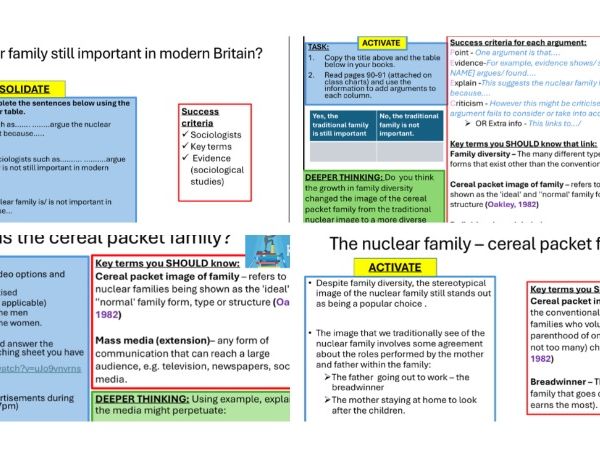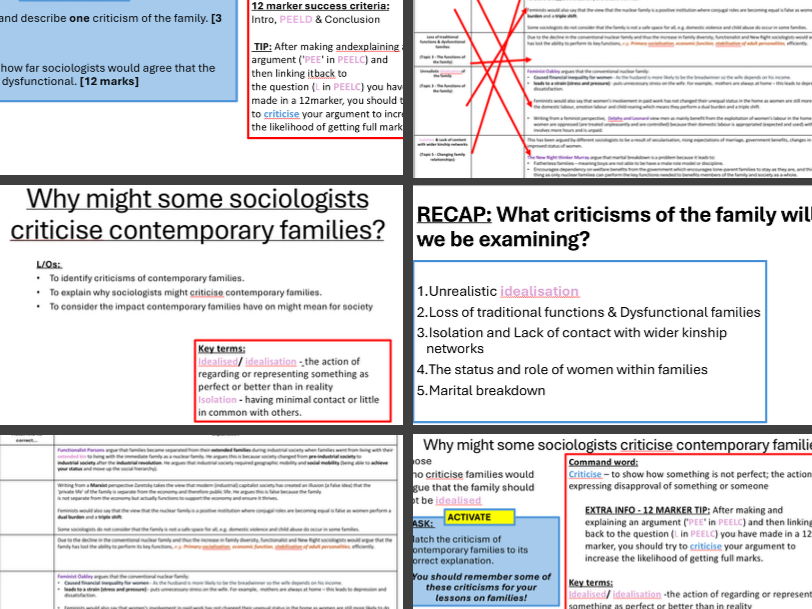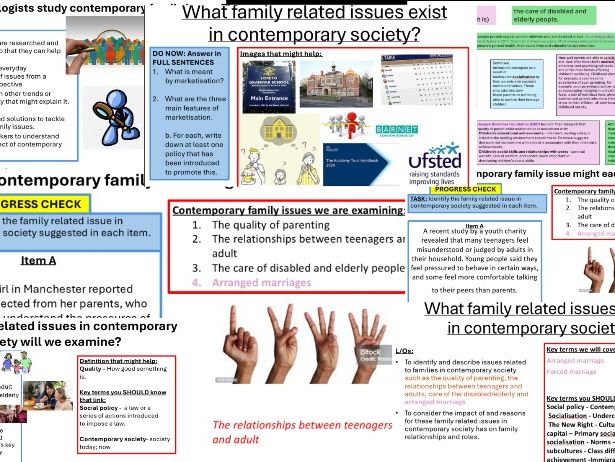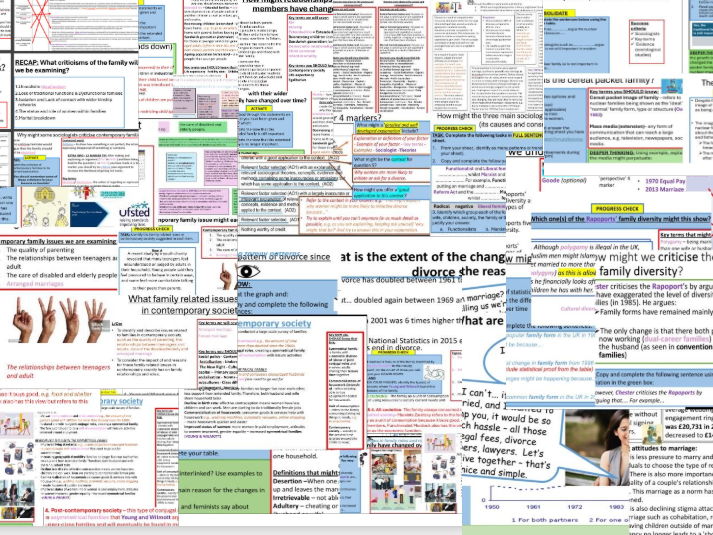Resources included (9)

AQA GCSE Sociology: Family - Is the nuclear family still important?

AQA GCSE Sociology: Family - Criticisms of families in contemporary society

AQA GCSE Sociology: Family - Contemporary family issues

AQA GCSE Sociology: Family- Changes in Family Relationships

AQA GCSE Sociology: Family- Family diversity

AQA GCSE Sociology: Family- Changing patterns of marriage and their explanations

AQA GCSE Sociology: Family- Explaining the increase in divorce

AQA GCSE Sociology: Family-Changes in the family over time

AQA GCSE Sociology: Family - Theories of divorce
Topic 4 - Family diversity
L13 Divorce:
Detailed lesson with lots of scaffolding based on adaptive teaching that explain the increase in divorce.
Includes a 4 marker with detail scaffolding to help students answer it. Includes a student-friendly mark scheme for self or peer-assessment.
Includes two versions of the table needed for the carousel activity - one with scaffolding and one without
Covers the following key terms: Secularisation, Stigma, Empty shell marriage
Covers the following sociologists: Office for National Statistics (ONS), Dennis , Fletcher, Hart, Goode, 1969 Divorce Reform Act, Mitchell & Goody
Covers the following key terms you should already know: Function (of an instituition), Individualism, Collectivism, Contemporary society, Consumerism/ Consumption
ANSWERS TO SOME MAIN ACTIVITIES INCLUDED
Makes references to key terms students should know – Promotes a spiral curriculum by making links to key terms that students might have previously been taught that link to this lesson.
RESOURCES CAN BE FOUND AT THE END OF PPT.
L14 Theories of divorce:
Includes a ‘teaching to all’ activity that enables students to recap functionalist, Marxist and feminist views of society so that they can better understand their views on divorce.
Includes a 4 marker with scaffolding to help students answer it. Also includes a annotated 4 marker mark-scheme for self and peer-assessment and to enable students to understand how examiners will mark their 4 marker.
ANSWERS TO ALL ACTIVITIES INCLUDED.
L15 [Other] changing family patterns (reconstituted families, one-person households, dual career families, fertility and childbearing, lone-parent, same-sex couples, extended families and cohabitation rates):
Detailed lesson with lots of scaffolding based on adaptive teaching that help students understand changing patterns of marriage and their explanations.
Examines the trends in first marriages, marriages in churches, serial monogamy and age of marriage and the reasons for them.
Provides scaffolding to allow student to apply Marxism, functionalism and feminism (and sociologists they should have previously learnt about - Parsons, Ansley, Zaretsky and Delphy and Leonard) to the changing patterns of marriage.
Mind map for main activity can be printed out or you can get students to copy it out.
Includes a 4 marker with scaffolding to help students answer it.
RESOURCES CAN BE FOUND AT THE END OF THE PPT.
Covers the following key terms: Serial monogamy, Re-marriages
Makes reference to the following key sociologists: Bridebook, Parsons, Ansley, Zaretsky, Delphy and Leonard
Makes links to the following key terms that you should already know: Stigma, Secularisation, Feminism, Cohabitation - promotes a spiral curriculum by making links to key terms that students might have previously been taught that link to this lesson.
ANSWERS TO ALL MAIN ACTIVITIES INCLUDED.
L16 Family diversity:
Detailed lesson with lots of scaffolding based on adaptive teaching that help students understand family diversity.
Includes a 4 marker with scaffolding to help students answer it.
Progress check can be taught as ‘teaching to all’ activity by getting students to show the family diversity they think is the answer on their fingers (1-5)s
Includes key term and definitions sheet for the lesson (new key terms and key terms students should have previously learnt that link to the lesson)
ANSWERS TO MOST ACTIVITIES INCLUDED
Covers the following key terms: Organisational diversity, Cultural diversity, Social class diversity , Cohort/ generational diversity, Life course diversity, Secularisation, Monogamy , Polygamy , Polygyny, Polyandry , Arranged marriage
Covers the following sociologists: 1969 Divorce Reform Act, 1970 Equal Pay Act, 2013 Marriage Act, The Rapoports Goode
Covers the following key terms that you should already know: Dual-career family, Family form/ structure/ type, Nuclear family, Conjugal roles, Conventional nuclear family, Lone-parent family, Vertically-extended family, Cohabitation , Same sex family, Horizontally-extended family , Empty-nest family, Family diversity, Contemporary society, Gender roles
Makes references to key terms students should know – Promotes a spiral curriculum by making links to key terms that students might have previously been taught that link to this lesson.
RESOURCES CAN BE FOUND AT THE END OF PPT.
L17 Is the nuclear family still important?:
Detailed lesson with lots of scaffolding based on adaptive teaching that help students understand arguments for and against the nuclear family still being important in modern Britain.
Covers the following sociologists: Oakley,1982
Key terms you should know: Cereal packet image of family, breadwinner
Resources can be found at the end of PPT
No starter activity
This lesson is set as homework but can be edited by adding video clips to make into a lesson to be taught by a teacher.
One activity requires pages for the AQA GCSE 9-1 Sociology Updated Edition by David Bown.
Topic 5 - Changes in the family over time
L18 AQA GCSE Sociology: Family-Changes in the family over time:
Detailed lesson with lots of scaffolding based on adaptive teaching that help students understand changes in the family over time.
-Includes a ‘teaching to all’ activity
-ANSWERS TO MOST ACTIVITIES INCLUDED
-Includes a item 4 marker on Young and Wilmott’s study with lots of scaffolding to help students answer it.
Covers the following key terms: Pre-industrial society, Industrial society, Unit of production, Asymmetrical family, The Principle of Stratified diffusion, Home-centered, Work-centered, Child-centered.
Covers the following key terms that you should already know: Pre-industrial society, Industrial society,
Contemporary society, Agriculture, Industries, Industrial revolution, Unit of production, Unit of consumption, Extended family, Social mobility, Ascribed status, Means of production, Geographic mobility, Symmetrical family, Commercialisation of housework.
Covers the following sociologists:Young & Wilmott.
ANSWERS TO MOST MAIN ACTIVITIES INCLUDED
Makes references to key terms students should know – Promotes a spiral curriculum by making links to key terms that students might have previously been taught that link to this lesson.
L19 AQA GCSE Sociology: Family- Changes in Family Relationships:
Detailed lesson with lots of scaffolding based on adaptive teaching that help students understand changes in family relationships.
Covers the following key terms: Kin, Kinship, Extended kin, Democratic relationships, Child cantered, Infant morality.
Covers the following sociologists:Young & Wilmott, Aries, Shorter, 1918 Education Act, Brannen, Pyror and Tinder, Charles et al (2008a.), Charles et al (2008b.), Bhatti
Makes references to key terms students should know- Promotes a spiral curriculum by making links to key terms that students might have previously been taught that link to this lesson.
Starter is keyword bingo and requires teacher to know the definitions of key terms previously learnt in the family unit.
ANSWERS TO SOME ACTIVITIES INCLUDED
RESOURCES CAN BE FOUND AT THE END OF THE PPT.
Topic 6 - Contemporary family issues
L20 AQA GCSE Sociology: Family- Contemporary family issues:
Detailed lesson with lots of scaffolding based on adaptive teaching that help students understand how to identify and describe issues related to families in contemporary society such as the quality of parenting, the relationships between teenagers and adults, care of the disabled/elderly and arranged marriage.
Cover the following key terms: arrange marriage, forced marriage
Key terms you should know: Social policy - Contemporary society - Socialisation - Underclass - Dependency culture - The New Right - Cultural deprivation - Cultural capital – Primary socialisation - Secondary socialisation - Norms – Values - Culture – Pupil subcultures - Class differences in education achievement -Immigration - Monogamy
Resources can be found at the end of PPT
Starter recaps the marketisation of education
Involves a teaching to all activity
Progress check activity develops the item reading and comprehension skills required to answer Item A/C 4 markers.
Includes multiple video links of varying lengths
Makes reference to childhood obesity, health inequalities in children and young carers.
Includes a 3 marker and 4 marker exam-style question.
ANSWERS TO MAIN ACTIVITIES INCLUDED.
L21 AQA GCSE Sociology: Family- Criticisms of families in contemporary society:
Detailed lesson with lots of scaffolding based on adaptive teaching that help students understand the impact contemporary families have on might mean for society.
Cover the following key terms:Idealised/ idealisation , isolation
Covers the following sociologists: Parsons, Zaretsky, Oakley, Murray, Delphy and Leonard
Key terms you should know: Dysfunctional - not operating normally or properly.
Resources can be found at the end of PPT
ANSWERS TO MAIN ACTIVITY INCLUDED
Includes a 3 and 12 marker exam-style question.
- Does not include a lesson on consequences of divorce and a lesson on Marriage.
Something went wrong, please try again later.
This resource hasn't been reviewed yet
To ensure quality for our reviews, only customers who have purchased this resource can review it
to let us know if it violates our terms and conditions.
Our customer service team will review your report and will be in touch.
